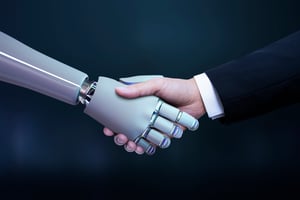The great Artificial Intelligence debate – replacing human workers or creating more jobs in society?
Artificial Intelligence (AI) is the most talked about controversy in technology. The extent robotic replacement results in human labour becoming obsolete has shaken businesses. What exactly does the new wave of ‘intelligence’ comprise? Are we expected to get on board with the unknown? The counter-argument – an inevitable process in technological and economic advancement. However, some say this is the beginning of the end.
AI vs SAI
AI is the simulation of a digital computer or computer-controlled robot programmed to perform tasks commonly associated with intelligent beings. Replicating human intelligence processes using machines or computer systems is a touchy subject. The sector of workers outraged mainly by the potential phenomena are average day-to-day employees in less well-paid clerical and process-oriented roles. According to research by PwC for the Department of Business, Energy & Industrial Strategy, only in the long term will manual workers such as truck or taxi drivers fall victim to ‘robotic replacement’.
Super Artificial Intelligence (SAI) has become a subset of ‘anti-technology’ terminology conspiring against the potential wave of human cognitive replacement. Despite speculation, there has not been a clear roadmap on how super intelligence will look. The fear is of a mass SAI rollout within the first third of the next century. The predictions are digital computer operationalisation, a super-speed Internet of Things (IoT) programme or anything else that may erupt from technology pipelines.
Although mass unemployment is likely to occur, many speculate there will not be anything drastic except re-allocating roles. Researchers are predicting the extent AI and related computer sciences may follow historical patterns of structural labour force change. On a positive note, new technologies are forecasted to boost GDP by as much as 10% in 2023. Could this result in a substantial economic sweep for the recovering British economy or are employees likely to receive the shorter end of the stick?
Limitations to replacement
Labour-replacing AI varies systematically by sector and industry. The first wave of automatable replacement is predicted to hit the customer service industry. With nearly 300,000 British workers employed in this field, three-quarters are estimated to be displaced over the next two decades. The lucky winners of job security against computer intelligence are Nurses with the least automatable professional occupation, while Solicitors and Psychologists come at a close second. So, why does AI discriminate? The realities are that many of the top professions in our society reliant on morality and ethical reasoning are highly challenging and, without a doubt, impossible to replicate.
Legislators, Psychiatrists, Doctors and many professional qualifiers that fall under the same bank of intellect require a potent aspect of human cognition for successful operation. The verdict – AI and robotics will assist those in Health and Sciences as the industry transitions from collaborative care structures and embarks on precision medicine. Now the tone is set for robot-to-human cohesion in healthcare sectors; the future will likely be complementary to human labour rather than replaceable.
While social reassurance in health practices is band-aided by optimism in medicinal research, there are still barriers to overcome before the technological potential is realised. Ethical sensitivities towards conventional methods of treatment executed by doctors resurface yearly. As highlighted by PwC’s 2017 survey, only 27% of respondents from the UK said they were willing to have a major surgery performed by a robot instead of a doctor - the lowest willingness of any country surveyed.
Can Tech and Ethics meet common ground?
The empiricist philosopher Locke defined ethics as ‘the seeking out of Rules, Measures of humane actions, which lead to Happiness and the means to practice them’. Without delving too far into philosophy, it’s worth noting how setting out the ‘law of ethics and parameters’ have only been conducted so far by humans. When examining many segments within the AI debate, the collective agreement is that ethics falls under scrutiny when we introduce computer programming over human cognitive ability.
A robotic replacement may sound convenient in customer service and retail, yet it raises eyebrows in scientific departments. Despite machines having more processing power and memory than anticipated, they cannot mimic empathy, leadership or teamwork. As tech expands to broader territories of modern life, it’s necessary to rewind discussions about implementing AI without the risk of death, business collapse, or legal battles.
If you have any questions about Blackbelt Defence and how we can help you, do not hesitate to get in touch with the team by clicking the link below.
Unlock the potential of smartphone recycling for your business. Download our comprehensive white paper to gain valuable insights and proven grading strategies. Maximize profitability while making a positive environmental impact.



COMMENTS